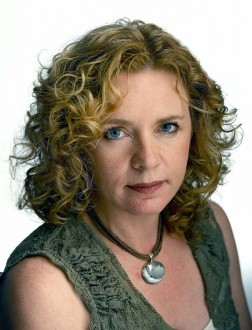Witch Burnings in Papua New Guinea—in 2013!

First delivered on "Women's Media Center Live with Robin Morgan," this "Fighting Words" commentary demands action in response to a horrifying news story reported by journalist Jo Chandler.
This is breaking news. A warning: it’s grim, but not ignorable. A journalist named Jo Chandler has been reporting it from Papua New Guinea (PNG), for The Global Mail. She’s an award-winning correspondent who’s risking her life by reporting on witch burnings there. Yes, you heard correctly, the burning alive of women accused of witchcraft. And no, this is not Europe in the Middle Ages.
In understated prose, she’s trying to call this dirty secret of PNG to the world’s attention. And I’m going to try my damndest to help her.
“They’re going to cook the sanguma mama!” It was a shout going up from a posse of children on February 6, 2013, as people in PNG’s western highlands provincial capital of Mount Hagen gathered. Then hundreds of bystanders watched while Kepari Leniata, the 20-year-old mother of a young baby, was accused of sanguma (witchcraft), then stripped naked by several assailants, bound, tortured with a hot iron rod that fused her genitals, doused in gasoline, and set alight on a pile of car tires. Spectators stood by as she writhed, screamed, and burned. Some took photographs with their mobile phones.
A similar scene had occurred two years ago, also in Mount Hagen, when an unidentified woman—as young as 16—was tied to the stake and burned. But this time there are photographs.
Belief in sorcery is still widespread in Papua New Guinea, where 80 percent of the seven million-plus population live in remote areas with little education, surviving on what they grow. The resources-rich country is in the midst of a mining boom, but wealth is held tightly by the few.
Current ritual attacks on accused sanguma have broken traditional boundaries. Previously they were hideous enough—vengeful acts of a grieving family for perceived sorcery against a dead relative in a scientifically uneducated culture.
Now, tradition has morphed into something even more malignant, intensified by liquor and drugs; by the arrival of cash currency and the jealousies it invites; by poverty clashing with development that propels women out of customary silence, and by men, bitterly, brutally, resentful. Accusations of sanguma are also linked to opportunism and theft, as they were in the Middle Ages—used to deprive women of their land. In general, two thirds of PNG women are constantly exposed to domestic violence; about 50 percent become victims of sexual assaults (in the western highlands, 100 percent of women surveyed said they had been assaulted).
But only a fraction of sorcery incidents are reported. After the witch burning earlier this month, the public would not cooperate with the police, who, in effect, shrugged. PNG police are underpaid, undereducated, and notoriously corrupt.
The 2012 Law Reform Commission examination of sorcery-related attacks estimated about 150 cases of violence and killings occur each year in just one province, Simbu—wild, prime coffee country deep in the interior. Reports by UN agencies provide evidence of attacks on accused witches that include being roasted over slow fire, nailed to crosses, hung in public places and beaten to death, locked inside homes and set alight, weighted with stones and thrown into rivers, and hacked to death with machetes.
Horrified citizens in PNG are now finally demanding repeal of the 1971 sorcery act, which criminalized sorcery (thus dignifying the superstition with recognition) and also criminalized vigilantism. It aimed to acknowledge the tradition’s presence while providing a mechanism to have an accused sorcerer dealt with by the courts. But the act provided legal refuge for vigilantes to argue sorcery as a mitigating factor, and, when rarely prosecuted—to get off with light sentences or none. Meanwhile, development agencies are reluctant to touch the issue, because tradition and religion are taboos for donor agencies. So cultural relativism lives while women are burned to death.
Even assuming the political will emerges to stop this, it will be years before the terrorism fades. Any who try to intervene are in turn accused. In 2005, Anna Benny, a fearless woman with a reputation for protecting rape victims, tried to defend her sister-in-law from allegations of sorcery. Both women were killed. Police took no action.
We must do something. This is why we have a women’s movement. Write the PNG embassy and consulates. Write the U.S. State Department. (See addresses below.)Boycott Papua New Guinean coffee. Hold vigils. Tell people. Organize.
This is woman-hating pure, the sickness itself. No religion masks the superstition here. No hierarchy dictates its rules, as in Saudi Arabia. No authorities order and enforce regulations, as do the Taliban. This is the thing itself—raw, bestial, spontaneous. These are gangs of men tracking and torturing and burning women.
Yet in the midst of this hell, a woman journalist is risking her life to intervene with her words.
And I’m just trying to help Jo Chandler get her story out.
Listen to Women's Media Center Live with Robin Morgan at this link. Beginning Saturday, March 2, hear Morgan's interviews with award-winning New York Times columnist Gail Collins, actress Debora Winger on her anti-fracking activism, and Julie Burkhart, who is reopening the Kansas abortion clinic closed since the murder of Dr. George Tiller in 2009.
To demand action on behalf of the PNG women, contact:
Embassy, Independent State of Papua New Guinea
1779 Massachuetts Ave., NW
Washington, D.C. 20036
202-745-3680
info@pngembassy.org
Office of Global Women’s Issues
U.S. Department of State
2201 C Street NW
Washington, DC 20520
202-647-4000
Bureau of East Asian and Pacific Affairs
U.S. Department of State
2201 C Street NW
Washington, DC 20520
202-647-4000
More articles by Category: International, Media, Politics, Violence against women
More articles by Tag:



























